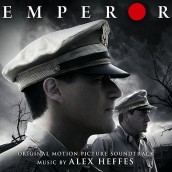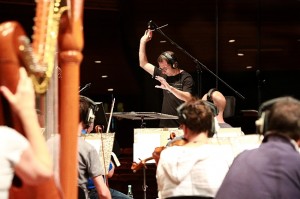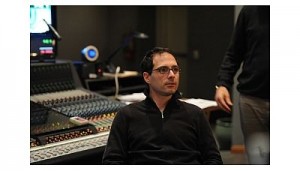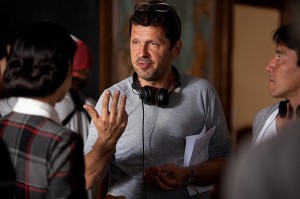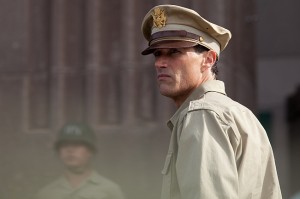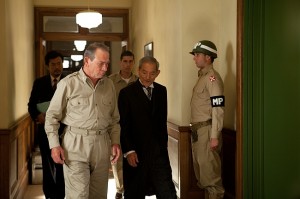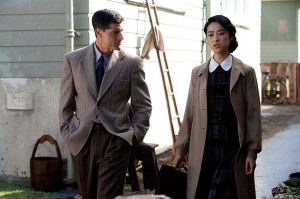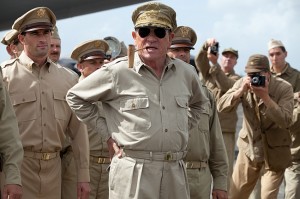The weight of history can be as dramatic as it is romantic, a counterpoint explored in any number of classical films, and symphonically lush scores that have dealt with the West’s awakening to the war-torn East. Now, that majestic sound has been robustly picked up by British composer Alex Heffes for EMPEROR, the new film from director Peter Webber (“Girl with the Pearl Earing”) that contrasts General MacArthur’s postwar search for the guilt, or innocence of the country’s god-ruler Hirohito with a military investigator’s desperate quest to determine if his Japanese fiancé has survived his nation’s bombing of her motherland during WW2.
Alex Heffes is a world traveler himself, ethereally capturing the danger of climbing an Andes peak in TOUCHING THE VOID, hearing the African heart of an 84 year-old FIRST GRADER and even composing original patriotic music for the Arab state of Qatar. But the score that would take him from smaller English pictures like THE PAROLE OFFICER and DEAR FRANKIE to the Hollywood likes of STATE OF PLAY and THE RITE would be THE LAST KING OF SCOTLAND, a soundtrack for a far more horrific imperious leader that saw Heffes venture to Uganda to record singers in a country formerly oppressed by Idi Amin.
EMPEROR is about an ancient Japanese spirit that’s as capable of beauty as it is atrocity. But where one might expect Heffes’ to take a similarly exotic approach to this score as his past journeys, here he’s mostly encapsulated a people’s mysterious mindset into a symphonically lavish voice, a fitting approach for a country that’s under American occupation. The authentic wind instruments and percussion that musically embody the now-devastated Japanese certainly play into EMPEROR, as given a stirringly percussive military drive to capture the life-or-death unraveling of Hirohito’s complicity in his country’s drive to WW2. Equally impactful, is the delicate melody for the Asian-inflected strings and piano of an impossible love between General Bonner and Aja, the daughter of a Japanese officer- a relationship revealed through moving flashbacks. Propelled by musically lush anger, heartbreak, and the hope of peace, the one emotion that Heffes’ beautifully powerful EMPEROR is likely to impress fans with is a romance for the kind of richly vibrant melodic scoring that ruled movie scores back in the day.
ASSIGNMENT X: Having scored The Last King of Scotland, what kind of musical opportunities do you think that history-based films give you?
ALEX HEFFES: I think it’s difficult to know exactly what opportunities arise directly from any given work. Sometimes the links are oblique. The one thing that I can now see about my career is that I’ve had a lot of diversity. Perhaps unusually so, and I love that. I did do a wonderful film a couple of years ago called THE FIRST GRADER (directed by Justin Chadwick) that was also a hybrid orchestral/African score. I guess that may have arisen from me having scored the Ugandan-based THE LAST KING OF SCOTLAND. THE FIRST GRADER turned out to be a very happy experience, as the film was lovely and the score won me the Ivor Novello award in the UK for Best Film Score of the year. The Brussels Symphony at the Ghent festival performed some of it live last fall. Following that experience I’m now working with Justin on his biopic of Nelson Mandela, THE LONG WALK TO FREEDOM.
AX: EMPEROR captures the feeling of a Japanese score, but through mainly orchestral means as opposed to using a lot of ethnic music. How did you hit on a score that’s more “West” than “East?” in deciding what instruments to use from both musical cultures?
HEFFES: At it’s heart, the film is a genuine attempt to understand the meeting of cultures at the end of WWII that led to the rehabilitation of Japan after it’s devastating military defeat. Here were two countries that really understood very little of what made each other tick deep down. I was very aware of this when writing. I didn’t want to pastiche Japanese music and undermine the veracity of the filmmakers’ approach. Instead, I tried to understand the psyche of both sides and reflect this through an orchestral score. Japanese music has such a different vocabulary to that of traditional Western music that I didn’t want the viewers to be alienated from the Japanese story by portraying it in a way that couldn’t be musically read by a western audience. That would seem to be creating an uneven playing field between the two sides, if you know what I mean. I did decide though that I would use a solo cello and solo Shakuhachi in duet with the orchestra in places to try and represent these two very different cultures meeting together.
AX: Though EMPEROR might not be a mega-budgeted film, the orchestra certainly lends itself to creating a spectacle worthy of one. How did you get such a symphonically powerful sound here?
HEFFES: I guess my atheistic is quite rooted in that sound. I love writing for orchestras and enjoy voicing them to speak in a full way, I had the pleasure of working with the New Zealand Symphony Orchestra on EMPEROR. They are a fine orchestra and we recorded in a beautiful concert hall in Wellington. The film deals with symphonic issues in a way. It’s a broad canvas. You have the backdrop of a post nuclear landscape against which there’s a tragic love story, the undying devotion of a people to it’s Emperor, and of course Tommy Lee Jones as General MacArthur!
I always conduct my own scores. This allows me to make fine adjustments to orchestration and voicing from the stand based on the needs of the film, but also how the orchestra sounds in the particular room or studio we are recording in. In the case of EMPEROR, I was able to make use of the large cello and bass section in the orchestra, and adjust doublings as I was conducting to get the richest sound out of the strings. Also, this orchestra is very used to performing in the hall we recorded in, so their own natural sense of balance allows for a very blended sound. As they are used to playing in concert I found them very responsive. They have a great dynamic range. Often things sound big when you have the courage to go small in places also. That sense of range is what gives musical “perspective.”
AX: Could you talk about the military aspect of EMPEROR, especially in regards to conveying MacArthur’s force-of-nature personality? In that respect, did you study any of the “general” scores by the likes of Jerry Goldsmith before starting on EMPEROR?
HEFFES: As a boy I was very taken with Goldsmith’s score to MacARTHUR. It’s very bold and uncompromising, of course like the man. I don’t think I drew on the memory of this music though for EMPEROR. Because he’s played incredibly well and pretty big on screen by Tommy Lee Jones, I didn’t feel he needed too much support. Instead I opted for a different tack. The opening title of film is a sequence depicting MacArthur and the US forces arriving in newly defeated Japan. I scored MacArthur’s arrival with a broad string theme, pretty triumphant and straightforward in its victory. For the end credits I used this same theme but reprised in a slow elegiac brass choral arrangement. The idea was to show how the initial victory turned into something more complex. Triumph turning to take a look at itself and seeing what lies a little deeper.
AX: Could you tell us about your collaboration with director Peter Webber?
HEFFES: Peter is a wonderful director who has a great interest in music. We have worked together now on quite a variety of projects. He has very eclectic taste and is able to talk extremely eloquently about music and the emotional effect he is looking for in a scene. He encouraged me to explore the mix of Japanese and western styles, while utilizing some Japanese “restraint.” I think he particularly liked the Rebellion sequence as it uses the Kabuki and Taiko drums in a very stark way at the start and gradually adds orchestral elements through the cues until it morphs into something other. It was unexpected when he first saw it. In fact, I played him a demo of that sequence before it was finished while it was only a percussion track, but he liked the starkness of it so much I kept it very much in the same state for the final cue.
HEFFES: Well, there’s the military or MacArthur theme we just mentioned. There’s also a theme for Aya, the girl that General Bonner is trying to find through the film. Peter’s note to me was that it should be simple, but poignant. I used the solo piano with strings the first time you hear it. As the story progresses, this theme becomes harmonically darker and more dense. There’s also a simple motivic theme that you first hear on the EMPEROR title card. It’s really a minor brass cadence, but it becomes quite a major part of the score as the story progresses. I used it with a restless string ostinato below it with a snare drum to underscore the search for the truth about the Emperor. At the start of the film it’s a snare drum you hear tapping away. But as Bonner gets deeper into the Japanese world, the snare is replaced by Japanese percussion playing the same pattern. That was Peter’s idea actually, and a really good one I thought.
AX: How do you think that Japanese attitude towards duty, honor, and war is reflected through their musical culture?
HEFFES: Probably by trying to utilize a sense of restrained emotion. Not being Japanese myself this is the best way I could try to describe it to the audience. I talked to some of the Japanese cast after the Toronto Festival screening and was happy to hear that they thought the score communicated these qualities to them. Core human emotions and values such as duty and honor must transcend national boundaries. Perhaps this is one of the things to take away from the film. It’s the things we have in common that are stronger than the things that separate us as nations.
AX: Your music hearkens back in its way to such war-torn romances as Alfred Newman’s LOVE IS A MANY-SPLENDORED THING. Did you want to create that kind of classically lush Hollywood sound?
HEFFES: Of course I love that sound, but it’s important to keep on looking forward rather than back and see what you can add to that sound that is modern. I think I always try to be classic but modern at heart. You know, when I was starting out I wanted to be just like John Williams (of course!). But at some point I had the revelation that he had already been John Williams rather better than anyone else had been, or would be. So I realized you have to take what you love from the music you admire and ultimately find your own voice. You can do “you” better than anyone else – that’s what I always tell younger composers.
central question is whether to convict its god-like figurehead for potential war crimes. Having done other mystery-solving scores like STATE OF PLAY and RED RIDING HOOD, how did you want to handle that investigation here?
HEFFES: Quite a few films I’ve done seem to have a ‘solving the puzzle’ thread to them. So, for me it’s a sort of puzzle as to how to approach this freshly each time. But, just as all films are different, they all present their own solution. For EMPEROR, we chose to use percussion to give that underlying sense of pulse – the clock ticking I guess. I used fingers on metal percussion and some Japanese bamboo percussion as well. There’s also a restless string figure that comes right at the start of the film that becomes a motor later on as Bonner’s investigation gets deeper. But you know, these things are not always thought out in such straightforward terms. Once you are writing, music has a habit of taking form under its own gravity when you are on a roll. Sometimes the audience will have their own way of analyzing the music and hear things that perhaps I hadn’t thought of when I was writing it. So, your guess is as good as mine I’m sure.
AX: Does the fact that historically knowing the investigation’s outcome make the music’s role even more important in creating suspense?
HEFFES: This is an interesting conundrum that I’ve come across before. When we made TOUCHING THE VOID (some years ago now!), the director Kevin Macdonald and I asked this very same question. The film was based on a famous book about a climber who survived an incredible mountain accident. The story was narrated by the real climber who had clearly survived to tell the tale. Quite a few people told us that the audience would not feel any sense of suspense through the film, as they already knew the outcome. However, once the movie started showing to audiences and quickly became a runaway hit at the UK box office, it because clear that this wasn’t the case. This has become a more often noticed phenomenon now I think. I noticed the same thing with ARGO, I don’t think knowing the history affects how edgy you feel in the airport scene at the end of the film!
AX: You’ll be scoring a big action prison breakout team-up with Stallone and Schwarzenegger next for THE TOMB, which I imagine will be a far more militaristic and action-oriented score. What can you tell us about it?
HEFFES: Yes, we’ve just finished that. It’s a lot of fun. The film is really terrific and I think is going to please a lot of Stallone and Schwarzenegger fans everywhere. They are on top form and playing alongside each other like you’ve never seen before in a movie. The film is set in a futuristic hi-tech prison. There are a lot of visual effects, and a lot of action. It’s a huge, hi-tech hybrid action score. Probably the biggest score I’ve done. There’s a LOT of music!
AX: How has the experience of moving from England to Hollywood been for you? And how do you let people know that you can have the diversity to score films as different as EMPEROR and THE TOMB?
HEFFES: Working in Hollywood for a few years now has allowed me to understand the system from the inside. Of course, it’s all about people. It’s a relatively small community here, so you get to know many people very quickly. I’ve enjoyed the sense of community there is on the Hollywood music scene. Plus, I know the sound of all the stages and having conducted the orchestras often I know many of the players here. That’s a real bonus for getting the best results. As far as diversity goes – Well, you know, it’s is a great thing. I love it. But it can confuse people sometimes. It’s maybe easier to be known as the guy who does “action’ or ‘comedy’ etc. However, I’ve grown up idolizing the great composers who had varied and long careers moving from genre to genre while retaining their own voice unmistakably along the way. I’d like to fall into that category please.
Clink on the link to buy the EMPEROR soundtrack
Clink on the link to visit Alex Heffes’ website
AGREE? DISAGREE? LET YOUR VOICE BE HEARD – COMMENT BELOW
Fan us on Facebook at ASSIGNMENT X
Article Source: Assignment X
Article:Composer Alex Heffes on EMPEROR
Related Posts:




